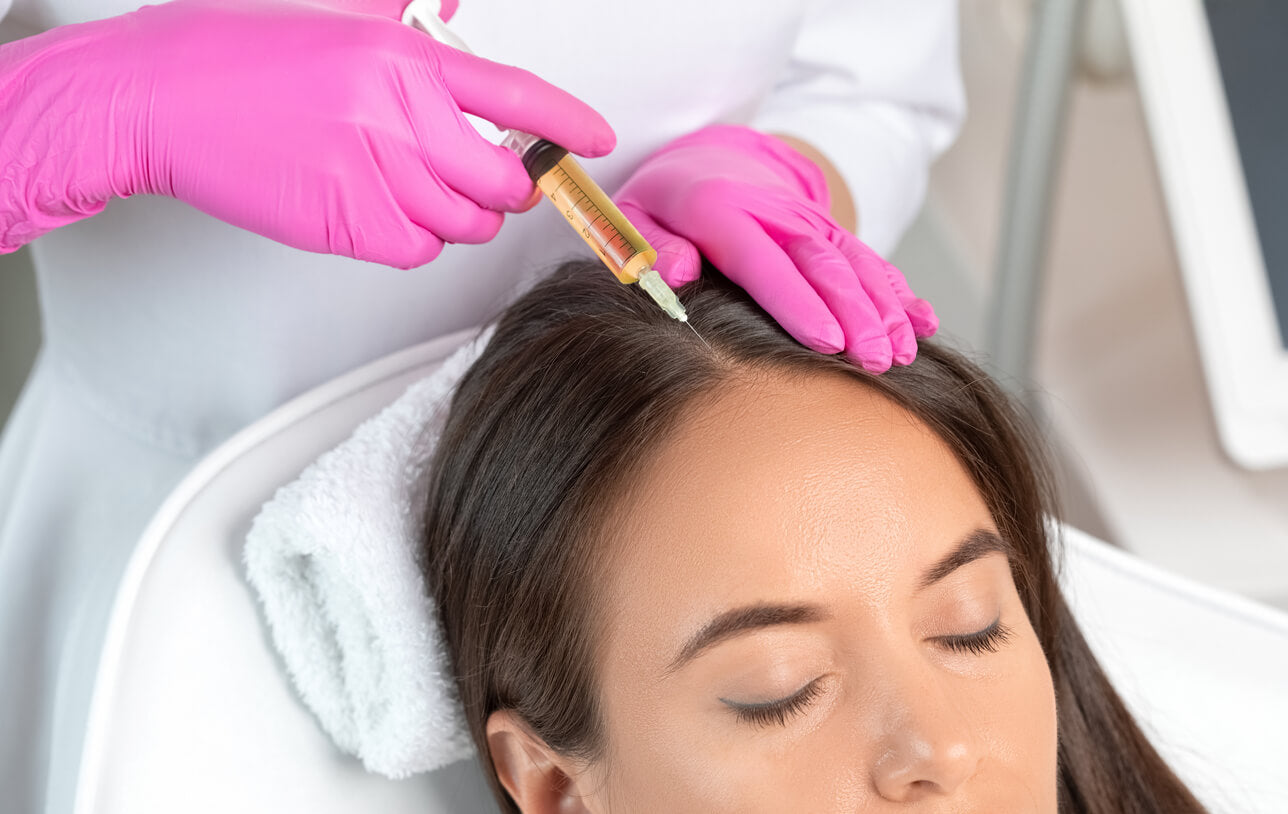Ahhh, water. It's the elixir of life and the thing that keeps us hydrated. It's the wondrous liquid that cleans our skin and offers sweet relief on a hot summer's day.
Though it's generally crystal clear in color, not all water is made the same. Some water is hard, and some is soft. And often, you can't tell the difference just by looking at it. Unfortunately, if you live in a hard water area, you're more than likely showering with water that has a high mineral concentration. And this means you could suffer some adverse effects. Some reports suggest that hard water can create hair damage and even cause hair loss over time.
Whether you're trying to determine whether you have hard water or you're dealing with the unwanted side effects of it, VEGAMOUR spoke to the experts to break down the hard water issue and find the remedies that really work.
#include-related-slider#
What Is Hard Water?
Though all water tends to look the same, hard and soft water can actually be pretty different. "Hard water is generally defined as water that contains varying levels of dissolved minerals," said Kenton Jones, a Certified Water Specialist through the Water Quality Association."These minerals are usually calcium and magnesium, although other minerals can also make up hardness. Water hardness isn't considered to be bad for your health. Still, it can cause problems with your home's plumbing (limescale or mineral build up in the pipes and on fixtures), can be difficult to clean (water droplets on your shower door and dishes), and many people don't like the feeling of hard water on their skin and hair."
Breaking it down with further information, Jones continued, "Hard water is categorized by the USGS (Unites State Geological Survey) in 4 levels depending on the concentration of calcium carbonate (CaCO3) found in the water:
- Soft: 0-60 mg/L (milligrams per liter) CaCO3
- Moderate: 61-120 mg/L CaCO3
- Hard: 121-180 mg/L CaCO3
- Very Hard: >181 mg/L CaCO3"
On the other hand, soft water contains a high level of sodium or saltwater, which tends to be kinder to the hair and scalp and skin. As a general rule of thumb, the softer your water, the better it is for you.
Shop VEGAMOUR: Plant-Based Products to Support Hair Wellness
How Do You Know If You Have Hard Water?
Though it sounds pretty complex, there are some common telltale signs that hard tap water and excess calcium and magnesium leave behind.
Here are some signs you may have hard water:
- Chalky spots: If your glasses and dishes look unclean (think white streaks), even after running them through the dishwasher, you could be experiencing excess minerals in your water.
- Film-like feeling on your skin: If after you've washed your hands, you're left with soap scum residue, it could be caused by calcium in the water reacting to the soap. Rinse your hands for longer to rid yourself of the hard water film.
- Dry skin and scalp inflammation: As you rinse and wash for longer to help eliminate the calcium buildup, you could start to experience dryer skin.
- Mineral deposits: In addition to stubborn water droplets in your bathroom and kitchen, you could also notice mineral stains and streaks on your clothes. And if you wash your wares in hard water for too long, your clothes could wear out faster. Not good.
- Hair breakage or damage: Hard water doesn't allow for any moisture to penetrate the hairs. This can impact hair health by leaving strands looking and feeling dry and brittle. One study found that hard water can decrease the thickness of hair.
- Strange taste: If you're left with a funny taste in your mouth after drinking tap water, your water could be hard.
- Positive test results: "Determining if you have hard water can be pretty easy and inexpensive," Jones said. "You can have your water tested with kits that can be purchased from hardware stores or the internet. You could also have tests conducted by a variety of qualified labs."
If you upkeep a nourishing hair wellness routine, maintain a healthy diet and drink all the apple cider vinegar but still struggle with slow hair growth, it could be time to test your water for unwanted minerals.
Also: This Is What Chlorine Does to Your Hair
What Are the Risks Associated With Hard Water?
Though it can cause a fair amount of damage, there are no known serious health problems bought on by hard water. So while you can drink and wash quite healthily with hard water, over time, your hair and skin could start to show the effects.
Various scalp conditions can also arise if you shampoo your hair with hard water too frequently. Excess minerals (even though more minerals sounds like a good thing!) might leave you with an itchy scalp and a weaker skin barrier, which leaves it more susceptible to bacterial infections. And if you happen to have eczema, you could especially feel the negative effects.
Related: Here's Why TikTok Users Love Shower Water Filters for Better Skin and Hair
Does Hard Water Cause Hair Loss?
Hard water can leave residue on the hair and scalp. It can make your hair excessively dry and unpredictable to style. If hard water buildup keeps attaching to the hair, water can't get in, and the hair strands may eventually break off.
Cosmetologist and hair and beauty expert Ghanima Abdullah said, "If hard water causes problems for the hair, imagine what it does to the scalp! Over time, the buildup can impede the growth of the hair and even cause hair fall due to blocked hair follicles."
Hard water hair loss issues can crop up as a result of scalp calcification. There are many substances, including dead skin, hair products and oil, that can block hair follicles and cause hair thinning, but scalp calcification occurs explicitly due to too much hard water and calcium. When there is a calcium overload, the blood vessels stiffen up, and the blood flow decreases. The reduced blood flow often means the hair follicles don't get the essential nutrients they need, which can cause serious hair loss. This is exactly why regular scalp massages can be so effective for hair loss — they increase circulation to your scalp and you can easily target problem areas with your fingers or a handheld scalp massager.
Scalp calcification is accelerated when shampoos are thrown into the mix. The hard water combines with the formula and creates soap scum. This hardening substance clings on and can intensify hair loss and breakage. And it's not just shampoo. Abdullah explained, "Leave-in conditioner and styling products can mix with the hard water buildup and leave a gummy layer on the hair."
Before you panic about the quality of your water and reach for a plethora of remedies, it's worth checking in with your dermatologist or doctor first. Hair loss can occur for many reasons, including telogen effluvium, so give yourself a little reassurance and get it properly looked at.
Learn: Is It Safe to Take Prenatal Vitamins for Hair Growth?
What Helps Hair If You Have Hard Water?
If you have hard water, you may want to consider a water softener solution. Shower filters offer a quick fix that can completely change the condition of your water by combating hard water and chlorine. Many shower filter brands also sell water softener showerheads that can improve water and make it easier on your hair and skin.
But buyer beware! Some brands have gone as far as to claim that their showerheads and filters will improve your breathing, while others promise to reduce frizz and promote shiny, healthy hair. If you're looking for a new showerhead or shower filter, do your research.
Washing hair in hard water can cause hair to become frizzy, thin, tangled and dull. It can also create some dramatic hair fall. If you want to level up your shower game, use a clarifying shampoo or powerful pre-shower scalp treatment like GRO Scalp Detoxifying Serum once a week to decrease the buildup. An occasional diluted apple cider vinegar rinse can also help dissolve away the minerals.
If you're experiencing dandruff or a flaky, dry scalp, you could try making a DIY hair mask such as one with an aloe vera juice, which can help soothe the situation, but always check with a healthcare professional if you're really struggling.
More From VEGAMOUR
- Shop Shea Whitney's Healthy Hair Routine
- Can Dandruff Cause Hair Loss? A Dermatologist Explains
- Are Baby Hairs a Sign of Breakage or New Growth?
- The Hair Growth Trick You Never Thought Of: Rubbing Your Nails Together
Photo credit: Andrea Davis/Unsplash
Back


















